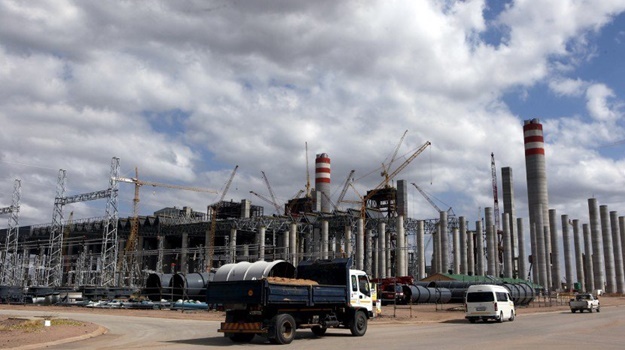
Medupi is a fitting symbol of the importance of our SOEs – Ramaphosa
by Staff ReporterThe problems with the construction of Medupi and Kusile power stations account for much of the financial crisis at Eskom, says President Cyril Ramaphosa, but they are a fitting symbol of the importance of the country’s state-owned enterprises.
Ramaphosa, in his newsletter to South Africans on Monday, described how, when he visited Medupi power station for the first time two weeks ago, he was struck by how massive it is.
“It is one thing to be told in a briefing that, when completed, Medupi will be the fourth largest power stations of its kind in the world; but it is quite another thing to stand below its towering turbines,” he said.
“In many ways, Medupi is a fitting symbol of the importance of our state-owned enterprises.”
Ramaphosa was candid about the state of the project: The cost of building the power station has escalated dramatically since its building started, it is behind schedule and – with five of its six units now in commercial operation – it is not yet performing at the level it is expected to perform, he said.
Ramaphosa admitted that the problems with the construction of Medupi and its “twin”, Kusile, account for much of the financial crisis at Eskom.
“There have been other factors, of course, not least of which are the effects of state capture, corruption, loss and shortage of essential skills and mismanagement.”
But, he continued, Medupi is impressive.
Once the work to correct the problems with its design and construction is complete, it is expected to contribute about 4700 megawatts into the national grid, producing enough power in a year to meet the electricity needs of more than a million people.
“Our country has a suite of major state-owned enterprises. Despite severe financial difficulties and operational problems, they have great assets, a large and diverse cohort of skilled people and solid track records. These companies have the potential to contribute to the growth of our economy and the creation of jobs.
“Although many of these companies are deeply in debt, they remain valuable state assets with immense capacity. We will not allow any of these strategic entities to fail. Rather, we need to take all necessary steps – even drastic ones – to restore them to health.
Despite the depth of current challenges, none of our SOEs is lost. They can all be saved. But it will take extraordinary effort and, in some cases, tough decisionsCyril Ramaphosa
This is why we supported the decision last week to place South African Airways into business rescue.”
Ramaphosa said there was no other viable and financially workable option for a credible future for the airline. The financial crisis had become so grave that the only way to secure its survival was to take this extraordinary measure. With the support of lenders, government, management and workers, SAA will continue to operate while the airline undergoes the restructuring needed to make it a viable company.
“Business rescue is not the preferred option for fixing our state-owned enterprises, nor would it necessarily be advisable in other circumstances. But the resolve we have shown in putting SAA into business rescue cuts across all key SOEs. Whether it is Transnet or Eskom, Denel or Prasa, we are taking all necessary measures to turn them around.”
He said that some of the problems at SOEs were caused by outdated business models that were no longer fit for purpose.
“It is for this reason, for example, that Eskom is in the process of establishing three separate entities for generation, transmission and distribution. This will not only help Eskom overcome some of its financial and operational challenges, but it will contribute to a more efficient, cost-effective and sustainable energy sector.”
No more bailouts
A vital part of the turnaround effort is to reduce the dependence of SOEs on bailouts and guarantees from government, Ramaphosa said.
“For too long, the South African taxpayer has been funding inefficiency and mismanagement in SOEs. This is coming to an end.
“It is for this reason that these companies have been working to reduce their costs and increase revenue, to improve efficiency and to cut down on wastage. They have been looking at how to manage their debt and ensure that they maintain their investment in infrastructure. As has been the case in recent months, any further financial support from government comes with strict conditions that are designed to promote sustainability and self-sufficiency.”
Ramaphosa confirmed that the state would retain ownership of all those state-owned enterprises that are strategic.
For too long, the South African taxpayer has been funding inefficiency and mismanagement in SOEs. This is coming to an end.Cyril Ramaphosa
“This is so that these entities are able to perform the crucial economic and developmental functions that the market would not on its own be able to perform.”
Where necessary, the government would seek strategic equity partners to help with raising capital, injecting skills and technology, and improving efficiency.
When it came to the leadership of these entities, Ramaphosa said the state would ensure that boards and management are able to exercise their mandates in the interests of the public without undue political or other interference.
“Despite the depth of current challenges, none of our SOEs is lost. They can all be saved. But it will take extraordinary effort and, in some cases, tough decisions,” he said.